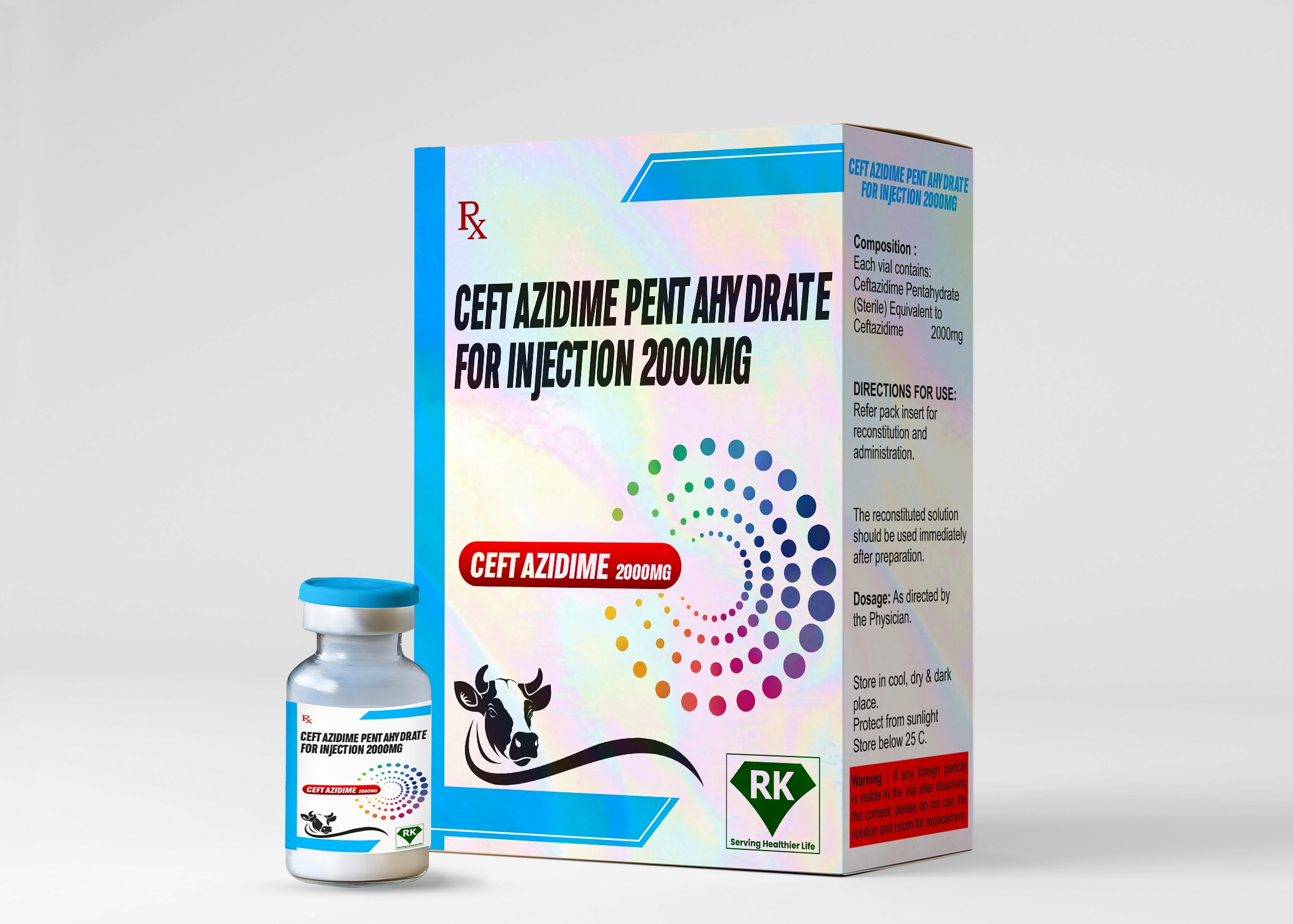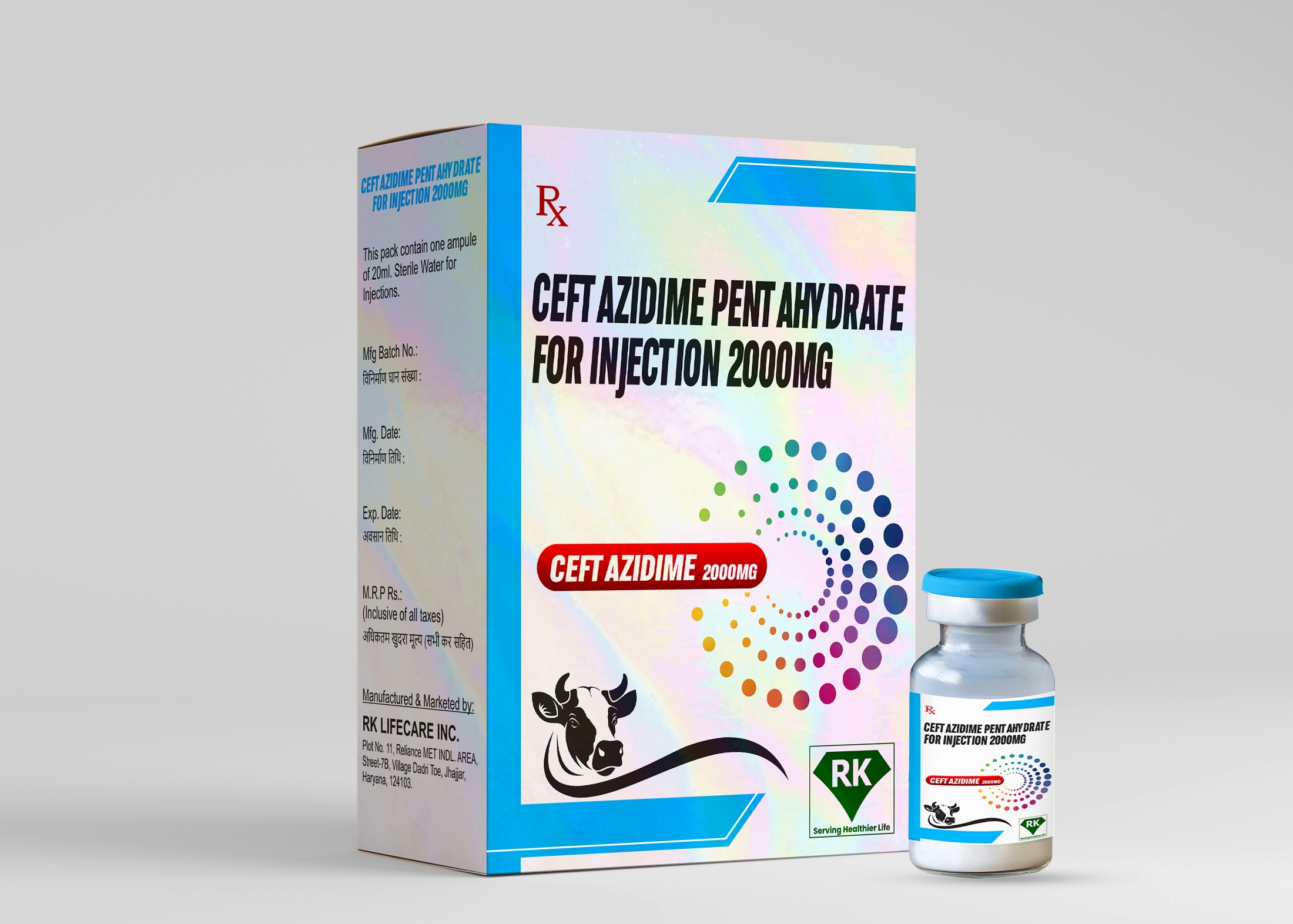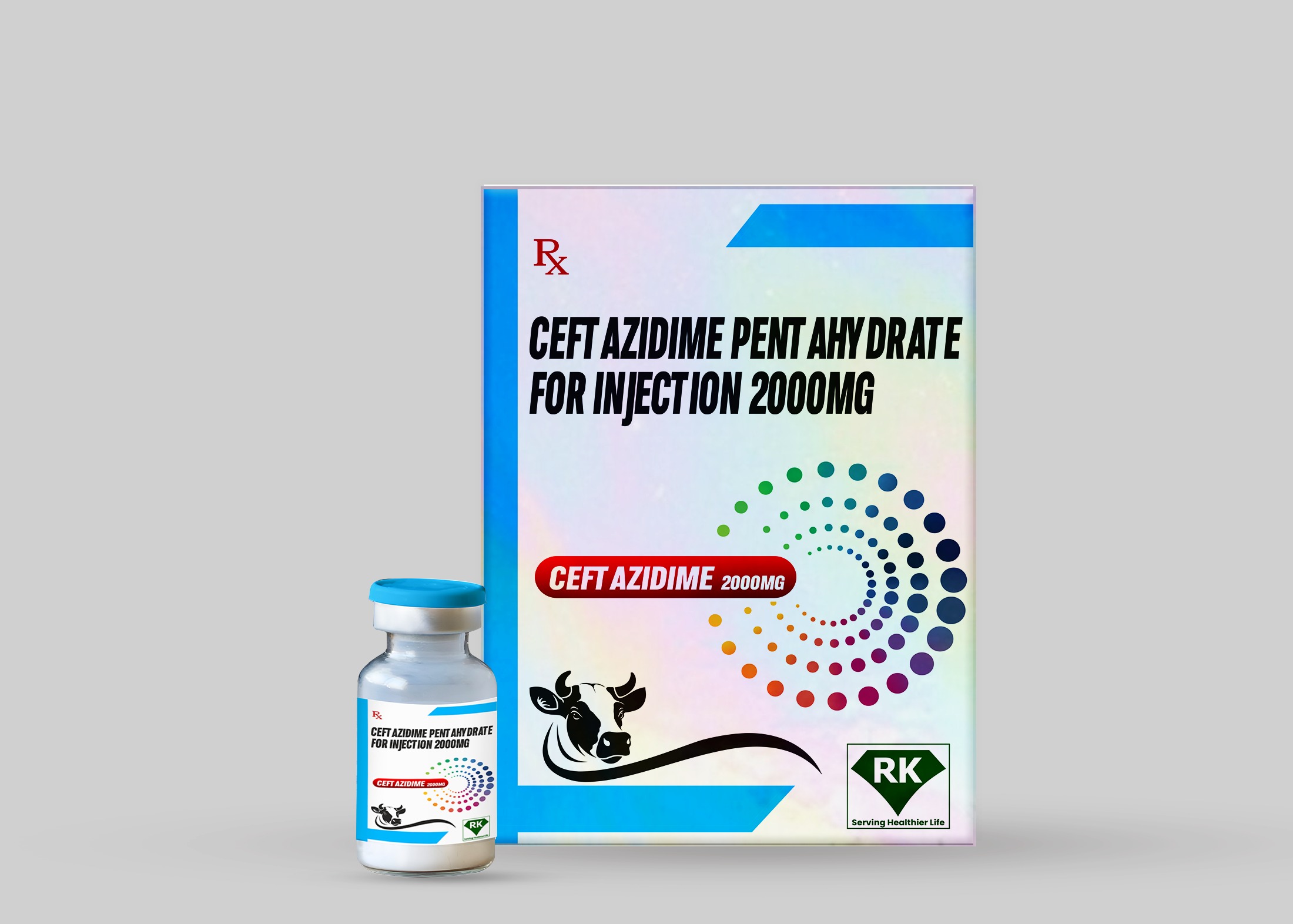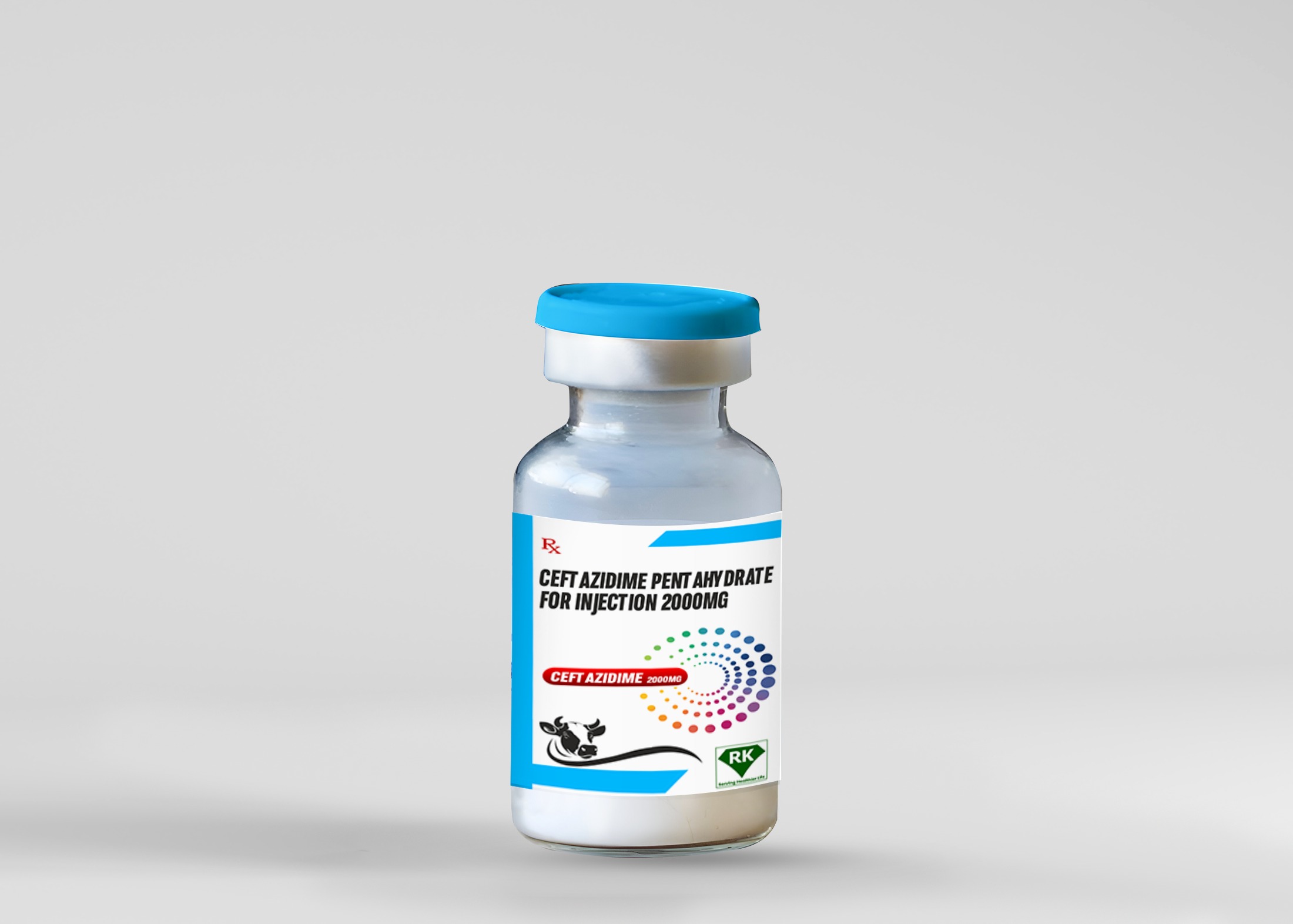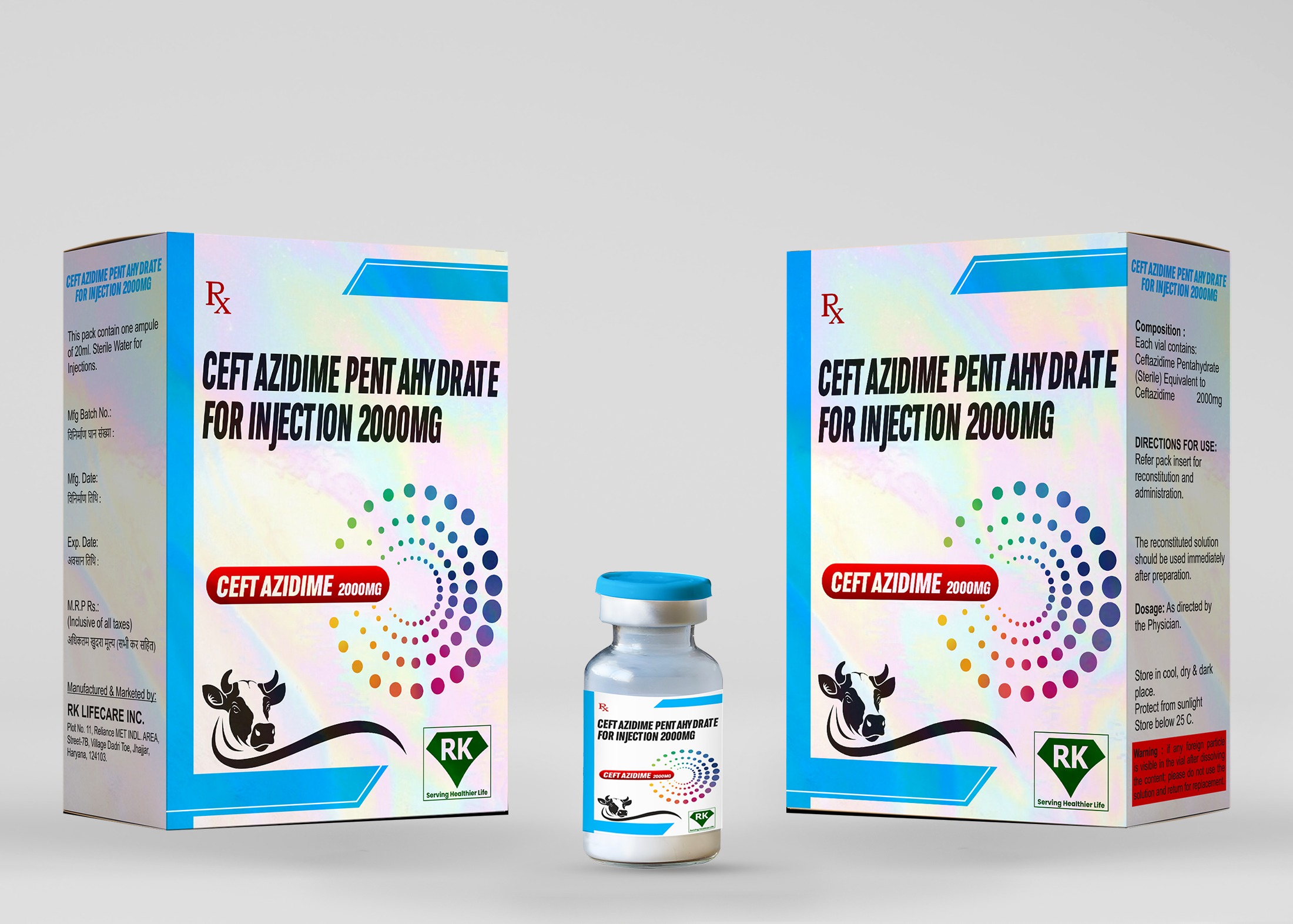R K Lifecare Inc: Leading Manufacturer and Wholesaler of Ceftazidime Pentahydrate for Injection 2000mg
At R K Lifecare Inc, We take immense pride in being a leading manufacturer and wholesaler of Ceftazidime Pentahydrate for Injection 2000mg in India. As a key player in the pharmaceutical industry, we specialize in manufacturing high-quality injectable formulations that meet the growing demand for effective antimicrobial treatments.
Our flagship product, Ceftazidime Pentahydrate Injection, is part of a comprehensive commitment to ensure the safety and health of patients in India and around the world. Ceftazidime Pentahydrate is a third-generation cephalosporin antibiotic used to treat a wide variety of bacterial infections.
With its potent activity against both gram-positive and gram-negative bacteria, it has proven efficacy in treating severe conditions such as pneumonia, urinary tract infections, and sepsis.
As a reliable Ceftazidime Pentahydrate Injection manufacturer in India, We ensure that every vial of this injectable formulation is produced under stringent quality standards to guarantee its safety, potency, and efficacy. Our manufacturing processes are conducted in compliance with international Good Manufacturing Practices (GMP), ensuring that our products meet global standards for safety and quality.
With our well-established position as a Ceftazidime Pentahydrate Injection wholesaler in India, we serve healthcare providers, distributors, and institutions across the country, including key areas such as Ceftazidime Pentahydrate Injection in Delhi NCR. We understand the importance of providing timely and reliable access to essential antibiotics, and we leverage our strong distribution network to ensure that our product is available where and when it is needed most.
Whether for use in hospitals, clinics or pharmacies, Ceftazidime Pentahydrate Injection suppliers in India can rely on our consistent supply and commitment to quality.
At R K Lifecare Inc, We are dedicated not only to manufacturing but also to ensuring that our Ceftazidime Pentahydrate Injection distributors and dealers in India have uninterrupted access to our products. As we continue to expand our reach, we aim to become the go-to name for healthcare professionals looking for reliable Ceftazidime Pentahydrate Injection suppliers in India.
By maintaining high-quality standards throughout the entire production process and building long-term relationships with our distribution partners, we ensure that patients across India have access to critical antimicrobial therapies that can save lives and improve health outcomes.
Manufacturing Process of Ceftazidime Pentahydrate for Injection 2000mg
The journey of Ceftazidime Pentahydrate for Injection 2000mg begins with a carefully designed manufacturing process that ensures the highest quality, potency, and safety of the final product. From raw material procurement to delivery, we strictly monitor each stage of the process. Below is an overview of the essential steps involved in the production of this life-saving antibiotic, which has a profound impact on the treatment of bacterial infections.
Procurement of Raw Materials
The first step in the production of Ceftazidime Pentahydrate Injection is sourcing high-quality raw materials. As Ceftazidime Pentahydrate Injection manufacturers in India, we prioritize sourcing active pharmaceutical ingredients (APIs) and excipients from trusted suppliers who meet the stringent requirements set by regulatory bodies.
The quality of raw materials directly impacts the efficacy and safety of the final product, which is why we only work with suppliers who comply with Good Manufacturing Practice (GMP) and provide certifications of authenticity and purity. After procurement, each batch of raw materials undergoes rigorous quality testing to ensure that it meets the required specifications before it is approved for use in production.
Quality Control (QC) of Raw Materials
At R K Lifecare INC, We believe that quality starts with raw materials. Therefore, we implement a comprehensive quality control (QC) process to test raw materials upon receipt. The active ingredient, Ceftazidime Pentahydrate, along with all excipients, undergoes identity, strength, and purity tests.
Our QC team ensures that all ingredients comply with the required pharmacopoeial standards, and any substandard ingredients are rejected. This rigorous QC process helps ensure that the final product is safe for patient use, with no compromise on its quality or effectiveness.
Formulation and Blending
Once the raw materials are approved, we proceed with the formulation and blending stage. In this stage, the API, Ceftazidime Pentahydrate, is mixed with the excipients to form a homogeneous solution that is ready for injection. This blending process requires a high level of precision to ensure that the concentration of the active ingredient is consistent throughout the batch.
Our experienced formulators work closely with advanced technologies to ensure that the correct proportion of each ingredient is used, resulting in a stable and effective formulation of Ceftazidime Pentahydrate for Injection 2000mg.
Sterile Filtration and Filling into Vials
After mixing, the solution undergoes sterile filtration to remove any particles or microorganisms present in it. This is a critical step in maintaining the sterility and safety of the injection. The solution is then filled into sterile vials using automated filling systems, which measure and fill each vial with the correct amount of solution. The filling process is carried out under aseptic conditions to prevent any contamination and ensure the safety of the final product.
Lyophilization (Freeze Drying) for Lyophilized Injections
In cases where ceftazidime pentahydrate for injection requires lyophilization (freeze-drying), the solution is frozen and subjected to a vacuum process that removes the moisture content. Lyophilization is a critical step for some injectable products, as it increases the shelf life and stability of the medication, especially when refrigeration is not possible. The freeze-drying process helps maintain the integrity of the antibiotic, making it easier to store and transport while maintaining its effectiveness when reconstituted.
Stoppering and Sealing
Once the vials are filled and, if necessary, lyophilized, the next step is stoppering and sealing. This step involves placing a rubber stopper on each vial to ensure that the contents remain sterile and safe. The vials are then sealed with an aluminum cap to prevent any external contaminants from entering the vial during storage or transportation. The stopper and seal play a vital role in maintaining the integrity of the injectable solution, ensuring that it remains safe for patient use until it reaches the healthcare provider.
Quality Control (QC) and Quality Assurance (QA) Testing
Before Ceftazidime Pentahydrate Injection 2000mg is released for distribution, it undergoes a final round of quality control (QC) and quality assurance (QA) testing. These tests include verification of the potency and purity of Ceftazidime Pentahydrate Injection, as well as testing for sterility, pH levels, and other essential characteristics.
Our QA team conducts extensive testing to ensure that the product complies with all regulatory requirements and that it meets the highest industry standards. This ensures that each vial of Ceftazidime Pentahydrate Injection is safe, effective, and ready for use.
Labeling and Packaging
Once the product passes all QC and QA tests, the next step is labeling and packaging. Each vial of Ceftazidime Pentahydrate Injection 2000mg is carefully labeled with the necessary product information, including dosage instructions, storage conditions, expiry date, and safety warnings. Our packaging is designed to protect the product during transportation and storage, to ensure it remains in optimal condition. We use high-quality materials for both labeling and packaging to ensure product integrity and safety. The labeling is also designed to meet regulatory guidelines, giving healthcare professionals all the necessary information to administer the injection safely and effectively.
Storage and Warehouse
After packaging, the product is stored in our state-of-the-art storage and warehouse facilities. These facilities are designed to maintain proper environmental conditions such as temperature and humidity to maintain the quality and potency of Ceftazidime Pentahydrate Injection 2000mg.
Our warehouse is fully equipped to handle large quantities of inventory, ensuring that we can meet the demand of our Ceftazidime Pentahydrate Injection distributors and suppliers in India. Proper storage is critical to ensure that the product remains stable and effective throughout its shelf life.
Distribution and Supply Chain Once the product is ready for distribution, it enters our efficient distribution and supply chain system. As Ceftazidime Pentahydrate Injection suppliers in India, we are committed to providing reliable and timely deliveries to our network of distributors, dealers, and healthcare providers.
Our logistics team ensures that Ceftazidime Pentahydrate Injection reaches the right locations across India, including Ceftazidime Pentahydrate Injection in Delhi NCR, to make it available to those in need. We work closely with Ceftazidime Pentahydrate Injection wholesalers in India to ensure a smooth and efficient supply process, ensuring that our product remains accessible to both medical professionals and patients.
Uses and Side Effects
Ceftazidime Pentahydrate Injection 2000mg is primarily used in the treatment of a wide range of bacterial infections. It is effective against both gram-negative and gram-positive bacteria and is used to treat serious conditions such as pneumonia, septicemia, urinary tract infections, and intra-abdominal infections.
Like all antibiotics, Ceftazidime Pentahydrate Injection may cause side effects such as allergic reactions, gastrointestinal problems, and local reactions at the injection site. It is important for healthcare providers to monitor patients for any adverse reactions and adjust treatment as needed.
At R K Lifecare Inc, we are dedicated to producing high-quality antibiotics that improve patient outcomes. Through our commitment to quality manufacturing processes and timely delivery, we aim to contribute to the global effort to combat infectious diseases. By ensuring the availability of Ceftazidime Pentahydrate Injection 2000mg, We help healthcare providers deliver effective treatments that save lives and improve health.
.jpg)
06 Feb 2026

04 Feb 2026

02 Feb 2026

29 Jan 2026
.jpg)
27 Jan 2026
